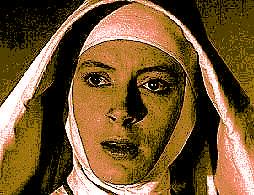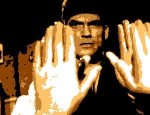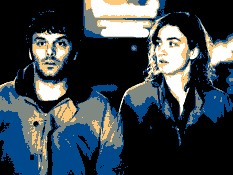Film Review

As was typical of Powell and Pressburger's films, Black Narcissus is a work with a complex moral subtext which is ambiguous and subject to interpretation. On the one hand, the film warns of the dangers of repressing one's emotions, of the devastation which can result when a passion is allowed to fester unchecked into dangerous obsession. The film also prompts us to reflect on what Christianity is about. The nuns we see in the film take an absurdly narrow view of Christianity - they regard a local spiritual mystic as a nuisance and are slow to recognise the earnestness of the Young Prince when he asks to study with them. Which is more important: cloistered devotion to God or an all-embracing love for humanity? It is the nun's narrow reading of the Gospel message which ultimately leads them to failure.
Black Narcissus affords Deborah Kerr one of her most memorable screen roles. In a mesmeric performance as the flawed Sister Clodagh, Kerr manages to convey, with remarkable subtlety and impact, the tension her character experiences between her faith, her ambition and her emotional weaknesses. There are some equally fine contributions from David Farrar and Sabu, and Kathleen Byron is utterly chilling when her character, Sister Ruth, appears to succumb to a demonic possession in the film's unforgettable climax.
The film was based on a novel by Rumer Godden, whose other well-known work, The River, would subsequently be adapted by French director Jean Renoir in 1951. Jack Cardiff's sumptuous and highly evocative colour photography makes Black Narcissus one of the most visually arresting films of all time - Technicolor has never looked so glorious. Along with Alfred Junge's stunning art direction, the striking cinematography captures the full sensuality of the film's exotic setting, lending depth, mystique and a whiff of eroticism to the compelling narrative. It's no surprise that both Cardiff and Junge won Oscars for their work on this film.
© James Travers 2008
The above content is owned by frenchfilms.org and must not be copied.
Film Synopsis
At the invitation of General Toda Rai, Sister Clodagh leads a group of Anglican nuns to a remote part of India to start a convent. High in the mountains of the Himalayas, the nuns convert an old palace into a school and hospital for the local people. Although their arrival is initially greeted with mistrust by the natives, the nuns soon find themselves fully occupied. Unfortunately, it isn't long before things start to go wrong. When a baby dies as a result of the nuns' treatment, the natives become unfriendly and stay away from the convent. Then, one of the nuns, Sister Ruth, is driven insane by her love for Mr Dean, a British government agent who has developed an ambivalent relationship with the nuns. Sister Clodagh is helpless as her world collapses around her...© James Travers
The above content is owned by frenchfilms.org and must not be copied.
Similar Films
Here are some other films you may enjoy watching:- Manèges (1950)
- Sciuscià (1946)
- The Wild One (1953)
- L'Enfer des anges (1941)
- A Story of Floating Weeds (1934)
Other related links:
Film Credits
- Director: Michael Powell, Emeric Pressburger
- Script: Michael Powell, Emeric Pressburger, Rumer Godden (novel)
- Cinematographer: Jack Cardiff
- Music: Brian Easdale
- Cast: Deborah Kerr (Sister Clodagh), Flora Robson (Sister Philippa), Jenny Laird (Sister Honey), Judith Furse (Sister Briony), Kathleen Byron (Sister Ruth), Esmond Knight (The Old General), Sabu (The Young General), David Farrar (Mr. Dean), Jean Simmons (Kanchi), May Hallatt (Angu Ayah), Eddie Whaley Jr. (Joseph Anthony), Shaun Noble (Con), Nancy Roberts (Mother Dorothea), Ley On (Phuba), Joan Cozier (Girl in Classroom), Helen de Broy (Clodagh's Mother in Flashback), Maxwell Foster (Clodagh's Father in Flashback), Margaret Scudamore (Clodagh's Grandmother in Flashback)
- Country: UK
- Language: English
- Support: Color
- Runtime: 100 min
The very best fantasy films in French cinema

The very best of Italian cinema

